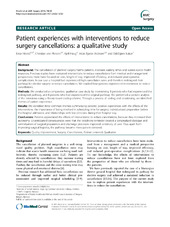| dc.contributor.author | Hovlid, Einar | en_US |
| dc.contributor.author | Plessen, Christian von | en_US |
| dc.contributor.author | Haug, Kjell | en_US |
| dc.contributor.author | Aslaksen, Aslak | en_US |
| dc.contributor.author | Bukve, Oddbjørn | en_US |
| dc.date.accessioned | 2013-09-13T13:16:34Z | |
| dc.date.available | 2013-09-13T13:16:34Z | |
| dc.date.issued | 2013-08-08 | eng |
| dc.Published | BMC Surgery 13(1):30 | eng |
| dc.identifier.issn | 1471-2482 | |
| dc.identifier.uri | https://hdl.handle.net/1956/7172 | |
| dc.description.abstract | Background: The cancellation of planned surgery harms patients, increases waiting times and wastes scarce health resources. Previous studies have evaluated interventions to reduce cancellations from medical and management perspectives; these have focused on cost, length of stay, improved efficiency, and reduced post-operative complications. In our case a hospital had experienced high cancellation rates and therefore redesigned their pathway for elective surgery to reduce cancelations. We studied how patients experienced interventions to reduce cancellations. Methods: We conducted a comparative, qualitative case study by interviewing 8 patients who had experienced the redesigned pathway, and 8 patients who had experienced the original pathway. We performed a content analysis of the interviews using a theory-based coding scheme. Through a process of coding and condensing, we identified themes of patient experience. Results: We identified three common themes summarizing patients’ positive experiences with the effects of the interventions: the importance of being involved in scheduling time for surgery, individualized preparation before the hospital admission, and relationships with few clinicians during their hospital stay. Conclusions: Patients appreciated the effects of interventions to reduce cancellations, because they increased their autonomy. Unanticipated consequences were that the telephone reminder created a personalized dialogue and centralization of surgical preparation and discharge processes improved continuity of care. Thus apart from improving surgical logistics, the pathway became more patient-centered. | en_US |
| dc.language.iso | eng | eng |
| dc.publisher | BioMed Central | eng |
| dc.relation.ispartof | <a href="http://hdl.handle.net/1956/7173" target="blank">Reducing cancellations of planned operations</a> | eng |
| dc.rights | Attribution CC BY | eng |
| dc.rights.uri | http://creativecommons.org/licenses/by/2.0/ | eng |
| dc.subject | Quality improvement | eng |
| dc.subject | Surgery | eng |
| dc.subject | Cancellations | eng |
| dc.subject | Patient centered | eng |
| dc.subject | Qualitative | eng |
| dc.title | Patient experiences with interventions to reduce surgery cancellations: a qualitative study | en_US |
| dc.type | Peer reviewed | |
| dc.type | Journal article | |
| dc.date.updated | 2013-08-23T08:34:37Z | |
| dc.description.version | publishedVersion | en_US |
| dc.rights.holder | Copyright 2013 Hovlid et al.; licensee BioMed Central Ltd. | |
| dc.rights.holder | Einar Hovlid et al.; licensee BioMed Central Ltd. | |
| dc.identifier.doi | https://doi.org/10.1186/1471-2482-13-30 | |
| dc.identifier.cristin | 1045976 | |
| dc.source.journal | BMC Surgery | |
| dc.source.40 | 13 | |
| dc.source.14 | 30 | |

